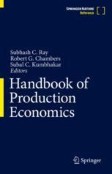Search
Search Results
-
Connecting Classical and Early Neoclassical Views on Savings and Capital Formation to Modern Growth Theory Through the Lens of F. P. Ramsey
We investigate the origins of modern growth theory using Ramsey’s seminal A Mathematical Theory of Saving (1928) by dividing Ramsey’s optimal savings...

-
Neoclassical Regional Growth Models
This chapter provides an overview of the literature on neoclassical growth, starting with the simple Solow-Swan model and highlighting the main...
-
Robert W. Dimand and Barbara J. Spencer Trevor Swan and the Neoclassical Growth Model
Addressing an American Economic Association session celebrating the fiftieth anniversary of his 1956 “Contribution to the Theory of Economic Growth”,...
-
Free labor mobility and indeterminacy in models of neoclassical growth
This paper establishes the conditions under which indeterminacy can occur in a Neoclassical growth model with international labor mobility. In the...
-
Internal adjustment costs of firm-specific factors and the neoclassical theory of the firm
This paper considers the predictions for factor demand of a two-sector vertically integrated model of firms producing output using firm-specific...
-
From Physiocratic School to Neoclassical Economics
Mercantilism has as object, the study of money and its intrinsic value, and it does not get to study economics as a relatively autonomous system,...
-
Economic Growth Models
The dynamic approach to decision-making is particularly well-suited to address economic growth. Typically, in optimal growth models a social planner...
-
Capitalism, Socialism, and the Neoclassical Trap
The entire approach of neoclassical economics focuses on proving the existence, uniqueness, and stability of the general equilibrium system and its...
-
Optimal allocations in growth models with private information
This paper considers a class of growth models with idiosyncratic human capital risk and private information about individual effort choices (moral...
-
The Neoclassical Growth Model Under a Constant Savings Rate
We present in this chapter the first growth model, introduced almost simultaneously by R. Solow and S. Swan in two different papers published in...
-
OLG Models with Uncertainty
This chapter introduces both idiosyncratic and aggregate uncertainty into overlap** generations (OLG) models. The methods used for the computation...
-
Threshold effect of foreign direct investment on economic growth in BRICS countries: new evidence from PTAR and PSTAR models
In recent years, the BRICS economies have attracted significant amounts of foreign direct investment (FDI). These FDI inflows has helped fuel their...

-
Neoclassical and Keynesian Approaches to International Transactions
The neoclassical approach to international payments is based on the interchangeability of national currencies, as if they were perfect, homogeneous...
-
Wage inequality and induced innovation in a classical-Marxian growth model
The present paper works out a classical-Marxian growth model with an endogenous direction of technical change and a heterogeneous labour force, made...

-
Endogenous Growth Models
The continuous and discrete time versions of the AK model are examined in detail, showing the absence of transition and the existence of a balanced...
-
Neoclassical Production Economics: An Introduction
To emphasize the nexus between the theory and the empirics of production, this chapter is split into two parts. The first presents a brief overview...
-
Cliometrics of Growth
This chapter lays the theoretical foundations of long-run economic growth. After providing an overview of the three fundamental regimes that have...
-
Uncovering the impact of cultural heritage on economic growth: empirical evidence from Greek regions, 2000–2019
This paper brings empirical evidence on the role of cultural heritage assets in promoting economic growth. The case of Greece at regional level over...

-
More on Growth Dynamics: Endogenous Growth and Beyond
Whether assuming exogenous savings or optimal intertemporal plans, the neoclassical growth model attributes to exogenous factors the process of...
-
The Crisis of the Neoclassical Framework and the Schumpeterian Echo in the Current Paradigm of the Economic Analysis of Technological Change
Despite a relative early attention, it was already well into the twentieth century when Schumpeter tried to reintroduce the question of technological...
